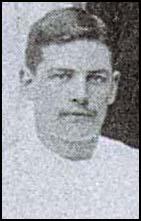Harry Campbell

Henry (Harry) Campbell was born in Renton, Scotland in 1867. An inside-foward, Campbell played local football for Renton. In 1888 Campbell was a member of Renton's Scottish Cup winning side.
On 15th March 1889 he won his first international cap playing for Scotland against Wales. One of the people watching this game was Tom Mitchell, the secretary of Blackburn Rovers. He was looking to strengthen his side by buying the best players from Scotland. Mitchell persuaded Campbell to join Blackburn. In doing so, he brought an end to his international career as at this time Scotland did not select men playing in England.
At the beginning of the 1889-90 season Tom Mitchell, the club secretary, recruited three other top players from Scotland: Tom Brandon, Johnny Forbes, and George Dewar. These players joined local men, James Forrest, Herbie Arthur, John Barton, Billy Townley, Nathan Walton, Joseph Lofthouse, Jack Southworth, John Horne and James Southworth.
Blackburn Rovers had little difficulty scoring goals that year. The team beat Notts County (9-1), Stoke (8-0), Aston Villa (7-0), Bolton Wanderers (7-1) and Burnley (7-1). Harry Campbell scored 15 goals that season.
In the 1889-90 season Blackburn Rovers finished in 3rd place, six points behind Preston North End. They did even better in the FA Cup. On the way to the final they beat Sunderland (4-2), Grimsby Town (3-0), Bootle (7-0) and Wolverhampton Wanderers (1-0).
Blackburn were odds-on favourites to win the cup against Sheffield Wednesday, who played in the Football Alliance league. Blackburn selected the following players: (G) John Horne, (2) Johnny Forbes, (3) James Southworth, (4) John Barton, (5) George Dewar, (6) James Forrest, (7) Joseph Lofthouse, (8) Harry Campbell, (9) Jack Southworth, (10) Nathan Walton and (11) Billy Townley.
Blackburn took the lead in the 6th minute when a shot from Townley was deflected past the Sheffield Wednesday goalkeeper. Campbell hit the post before Walton converted a pass from Townley. Blackburn scored a third before half-time when Southworth scored from another of Townley's dangerous crosses from the wing.
Townley scored his second, and Blackburn's fourth goal in the 50th minute. Bennett got one back for the Sheffield side when Bennett headed past the advancing Horne. Townley completed his hat-trick when he converted a pass from Lofthouse. Ten minutes before the end of the game, Lofthouse completed the scoring and Blackburn had won the cup 6-1. As Philip Gibbons pointed out in his book Association Football in Victorian England: "The Blackburn side had given one of the finest exhibitions of attacking football in an FA Cup Final, with England internationals, Walton, Townley, Lofthouse and John Southworth at the peak of their form."
Blackburn Rovers also reached the FA Cup final the following year. However, Campbell was replaced by Conrad Hall in the final that they won 3-1.
Campbell retired from professional football in 1893. In the four years he was at Blackburn Rovers he scored 22 goals in 98 games.
Harry Campbell died in 1915.
Primary Sources
(1) Mike Jackman, Blackburn Rovers : An Illustrated History (1995)
The Rovers were overwhelming favourites to lift the trophy as all of their team, bar Jimmy Southworth and Jack Horne, were of international status. Jack Southworth, Jack Barton, Jimmy Forrest, Joe Lofthouse, Billy Townley and Nat Walton were all English internationals, while John Forbes, Geordie Dewar and Henry Campbell had represented Scotland.
The rovers looked immaculate when they took to the field, being attired in white dress shirts that had been hastily acquired from a London outfitters once it was realised that Sheffield would be turning out in blue jerseys. Prior to the match a representative of the Blackburn Times spoke to someone who had been in the dressing room area and he had reported that while the Rovers players were singing and laughing the men from Sheffield were fraught with nerves. He predicted an easy victory for the Rovers and so it turned out. Billy Townley was undoubtedly the star of the show and he became the first man to score a hat-trick in the FA Cup Final as the Rovers romped to a 6-1 win.
(2) Philip Gibbons, Association Football in Victorian England (2001)
It was generally agreed that Blackburn had a little too much FA Cup experience for Wednesday, for whom Morley, Brayshaw, Mumford and Bennett performed splendidly. However, the Blackburn side had given one of the finest exhibitions of attacking football in an FA Cup Final, with England internationals, Walton, Townley, Lofthouse and John Southworth at the peak of their form.
